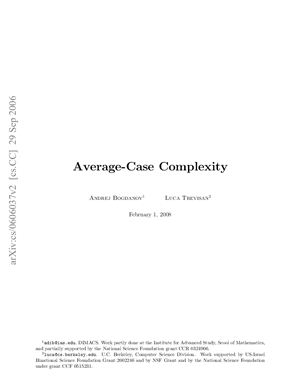Computing Research Repository, 2008, -81 pp.
We survey the average-case complexity of problems in NP.
We discuss various notions of good-on-average algorithms, and present completeness results due to Impagliazzo and Levin. Such completeness results establish the fact that if a certain specific (but somewhat artificial) NP problem is easy-on-average with respect to the uniform distribution, then all problems in NP are easy-on-average with respect to all samplable distributions. Applying the theory to natural distributional problems remain an outstanding open question. We review some natural distributional problems whose average-case complexity is of particular interest and that do not yet fit into this theory.
A major open question whether the existence of hard-on-average problems in NP can be based on the P?NP assumption or on related worst-case assumptions. We review negative results showing that certain proof techniques cannot prove such a result. While the relation between worst-case and average-case complexity for general NP problems remains open, there has been progress in understanding the relation between different degrees of average-case complexity. We discuss some of these hardness amplification results.
Introduction
Definitions of Efficient on Average
A Complete Problem for Computable Ensembles
Decision versus Search and One-Way Functions
Samplable Ensembles
Hardness Amplification
Worst-Case versus Average-Case and Cryptography
Other Topics
We survey the average-case complexity of problems in NP.
We discuss various notions of good-on-average algorithms, and present completeness results due to Impagliazzo and Levin. Such completeness results establish the fact that if a certain specific (but somewhat artificial) NP problem is easy-on-average with respect to the uniform distribution, then all problems in NP are easy-on-average with respect to all samplable distributions. Applying the theory to natural distributional problems remain an outstanding open question. We review some natural distributional problems whose average-case complexity is of particular interest and that do not yet fit into this theory.
A major open question whether the existence of hard-on-average problems in NP can be based on the P?NP assumption or on related worst-case assumptions. We review negative results showing that certain proof techniques cannot prove such a result. While the relation between worst-case and average-case complexity for general NP problems remains open, there has been progress in understanding the relation between different degrees of average-case complexity. We discuss some of these hardness amplification results.
Introduction
Definitions of Efficient on Average
A Complete Problem for Computable Ensembles
Decision versus Search and One-Way Functions
Samplable Ensembles
Hardness Amplification
Worst-Case versus Average-Case and Cryptography
Other Topics

